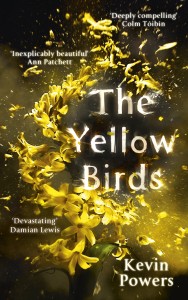Back in 2006, I spent the last few months of my degree course writing about the presentation of Post Traumatic Stress Disorder in the novels of Vietnam War veteran Tim O'Brien. I had previously enjoyed the poems of Wilfred Owen and still enjoy teaching them to pupils at school. I clearly enjoy reading about the torture that young men who go to war sense upon returning home, unable to clearly describe the sights that they have seen and the horrors they have endured. So, all that having been said, I was looking forward to this novel.
The novel focuses on Bart and Murph, two young soldiers who have come from humble backgrounds to join the army and fight in Iraq. The chapters flicker back and forth on his time before joining the army; fighting in Tal Afar; and his return home. There is some extremely good writing in this debut novel right from the opening lines: "The war tried to kill us in spring. As the grass greened the plans of Nineveh and the weather warmed, we patrolled the low-slung hills beyond the cities and towns. We moved over them and through the tall grass on faith, kneading paths into the windswept growth like pioneers. While we slept, the war rubbed its thousand ribs against the ground in prayer." For a first novel there are often passages like this which are majestic, accomplished writing.
Powers' writing has been compared to many literary greats of the American canon: Hemingway, O'Brien, Melville, and his admirers are not of low calibre - Hilary Mantel, Colm Toibin and Ann Pratchett are all fans. However, Powers does occasionally slip into cliché, "I hated the way he excelled in death and brutality and domination. But more than that, I hated the way he was necessary, how I felt like a coward until he screamed into my ear 'Shoot these hajji fucks!' I hated the way I loved him when I inched up out of the terror and returned fire, seeing him shooting too, smiling the whole time." He might as well have brought Lieutenant Dan back from catching shrimps with Forrest and put him into Tal Afar.
The novel focuses on Bart and Murph, two young soldiers who have come from humble backgrounds to join the army and fight in Iraq. The chapters flicker back and forth on his time before joining the army; fighting in Tal Afar; and his return home. There is some extremely good writing in this debut novel right from the opening lines: "The war tried to kill us in spring. As the grass greened the plans of Nineveh and the weather warmed, we patrolled the low-slung hills beyond the cities and towns. We moved over them and through the tall grass on faith, kneading paths into the windswept growth like pioneers. While we slept, the war rubbed its thousand ribs against the ground in prayer." For a first novel there are often passages like this which are majestic, accomplished writing.
Powers' writing has been compared to many literary greats of the American canon: Hemingway, O'Brien, Melville, and his admirers are not of low calibre - Hilary Mantel, Colm Toibin and Ann Pratchett are all fans. However, Powers does occasionally slip into cliché, "I hated the way he excelled in death and brutality and domination. But more than that, I hated the way he was necessary, how I felt like a coward until he screamed into my ear 'Shoot these hajji fucks!' I hated the way I loved him when I inched up out of the terror and returned fire, seeing him shooting too, smiling the whole time." He might as well have brought Lieutenant Dan back from catching shrimps with Forrest and put him into Tal Afar.
Powers says that the reason he wrote the novel was to try to explore the question: "What does it mean to try to be good and fail?" Something that struck me as I was reading this is that I am not sure that this question is explored fully: He made an unrealistic promise to a soldier's mum that he would look after him. He became desensitised to death whilst being a solider. He struggled to socialise and to find purpose in life upon his return. The novel is lauded as being a masterpiece, but I believe that it is 'only' good. Perhaps when more literature comes out of our very recent endeavours in Iraq and Afghanistan, the 'masterpiece' tag that Kevin Powers now holds will be reassessed.
Key quotations
- "All pain is the same. Only the details are different."
- "Freedom is not the same as lack of accountability."
- “I knew that at least a few of the stars I saw were probably gone already, collapsed into nothing. I felt like I was looking at a lie. But I didn't mind. The world makes liars of us all.”
Other thoughts
- I really wanted to like this novel but found myself getting bogged down by it and feeling it didn't flow. Having just looked at my chosen quotations and had a good think about it, it's got some exceptional writing in it. Maybe I need to read it again in the future and see if my mind changes. We'll see.

No comments:
Post a Comment